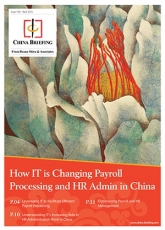Avoiding Labor Disputes in China: The Importance of the Staff Handbook
 By Stephen O’Regan
By Stephen O’Regan
Associate, International Business Advisory
Dezan Shira & Associates, Guangzhou
While a labor contract is vital in any employer-employee relationship, many employers overlook the importance of a having a staff handbook in China (also called an employee handbook or company rulebook). However, there are some key provisions that are not contained in standard contracts. While an employment contract details important terms such as working hours, salary, main duties and responsibilities, etc., key provisions such as overtime rules, codes of conduct, performance standards, promotion standards, and KPIs are often left out. This is where a staff handbook becomes beneficial, as they go into the finer and more individual rules of the company that all employees should be aware of. A staff handbook is an added layer of protection for the company and, while it is recommended for all foreign companies, it is especially crucial for growing companies with an employee count above ten.
The handbook provides supplemental explanations concerning mandatory terms and makes it easier to demonstrate that an employee has broken a company rule. Staff handbooks are an extra defense for a company in cases where a labor dispute has arisen. The company handbook should be clearly understood by all employees. Having a bilingual handbook, which is comprehensive but not excessively bland, signed by every employee ensures that the handbook can be used as support in a company’s defense should a dispute occur. It is also important to have the labor contract make references to the handbook, as this will strengthen the company’s case if a breach of rules occur.
![]() RELATED: Payroll and HR Services from Dezan Shira & Associates
RELATED: Payroll and HR Services from Dezan Shira & Associates
Companies cannot simply set anything as a rule in order to fully protect themselves. If a court finds that such is the case, they will more often than not side with the employee. In court, every rule in the handbook needs an explanation to back it up. This is also why it is advisable to keep the length of the handbook to a reasonable size. No court would support a company if their staff handbook was too long and unreasonable to follow. This would also add an extra burden on the HR department of the company to supervise the rules. Additionally, it is important to distinguish between major and minor breaches. Minor breaches, such as showing up late, might be punished by implementing fines or warnings. This must be noted in the handbook so all employees are aware of them. Major breaches, such as passing on confidential information, would result in immediate dismissal. It would also be important to mention how many minor breaches or warnings constitute a major breach.
A recent case can be used as an example. A manager who was dismissed brought arbitration against the employer and claimed severance payment as well as an additional one month’s salary due to being fired without 30 days written notice. The employer claimed that he was in serious violation of company rules due to signing an agreement with a supplier run by a relative and not informing the company in advance. The arbitration committee ruled in favor of the employer due to a signed staff handbook indicating that the manager in question was aware of this internal policy. Had there been no staff handbook, the dismissal could very well have been deemed unfair and the company could have been liable for severance compensation.
As mentioned above, it is important that all employees sign a copy of the handbook. Further, any changes made to the handbook also should be detailed to every employee and signed.
The contents of the handbook will vary per industry. Manufacturing companies will want to focus on issues relating to promptness, break lengths, safety requirements, etc. Business process outsourcing companies, on the other hand, will be more concerned with confidentiality of their clients’ information, while the food industry will focus on hygiene. However, regardless of the industry, companies should keep in mind the following considerations when drafting a staff handbook:
- Company code of conduct
- All internal rules, guidelines and the rights of both parties
- Relevant KPI (Key Performance Indicators) and performance standards and assessment information
- Nondisclosure agreement
- Information about work environment
- Work hours, overtime rules
- Remuneration rules, social welfare rules, bonuses
- Information about paid leaves
- Behaviour standards, discipline procedures
- Training information
- Workplace security rules
- Any other special rules relevant to the specific company/industry (i.e.: manufacturing safety standards, hygienic food production standards)
|
Asia Briefing Ltd. is a subsidiary of Dezan Shira & Associates. Dezan Shira is a specialist foreign direct investment practice, providing corporate establishment, business advisory, tax advisory and compliance, accounting, payroll, due diligence and financial review services to multinationals investing in China, Hong Kong, India, Vietnam, Singapore and the rest of ASEAN. For further information, please email china@dezshira.com or visit www.dezshira.com. Stay up to date with the latest business and investment trends in Asia by subscribing to our complimentary update service featuring news, commentary and regulatory insight. |

 Human Resources and Payroll in China 2015
Human Resources and Payroll in China 2015
This edition of Human Resources and Payroll in China, updated for 2015, provides a firm understanding of China’s laws and regulations related to human resources and payroll management – essential information for foreign investors looking to establish or already running a foreign-invested entity in China, local managers, and HR professionals needing to explain complex points of China’s labor policies.
 How IT is Changing Payroll Processing and HR Admin in China
How IT is Changing Payroll Processing and HR Admin in China
In this edition of China Briefing magazine, we examine how foreign multinationals can take better advantage of IT in the gathering, storing, and analyzing of HR information in China. We look at how IT can help foreign companies navigate China’s nuanced payroll processing regulations, explain how software platforms are becoming essential for HR, and finally answer questions on the efficacy of outsourcing payroll and HR in China.
 Labor Dispute Management in China
Labor Dispute Management in China
In this issue of China Briefing, we discuss how best to manage HR disputes in China. We begin by highlighting how China’s labor arbitration process – and its legal system in general – widely differs from the West, and then detail the labor disputes that foreign entities are likely to encounter when restructuring their China business. We conclude with a special feature from Business Advisory Manager Allan Xu, who explains the risks and procedures for terminating senior management in China.
- Previous Article Meat’s off the Menu: Exploring Opportunities for Meat Alternatives in China
- Next Article China Introduces Wide-Sweeping New Transfer Pricing Rules









